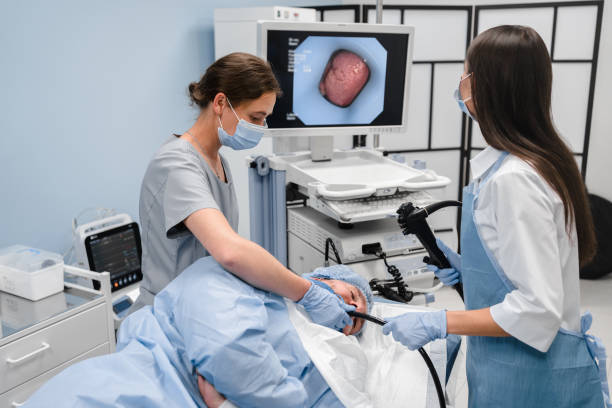
Gastroscopy surgery, also known as an upper gastrointestinal (GI) endoscopy, is a common medical procedure performed in Singapore. It is used to diagnose and sometimes treat conditions affecting the upper digestive system, including the esophagus, stomach, and the beginning of the small intestine. This blog explains everything you need to know about gastroscopy surgery in Singapore, including its purpose, procedure, and preparation.
What Is Gastroscopy Surgery?
Gastroscopy is a minimally invasive procedure that uses a thin, flexible tube called an endoscope. The tube is equipped with a tiny camera and light at its tip, allowing doctors to examine the lining of the upper digestive tract. In Singapore, gastroscopy is often recommended for individuals experiencing symptoms like:
- Persistent abdominal pain
- Chronic nausea or vomiting
- Difficulty swallowing
- Unexplained weight loss
- Acid reflux or heartburn
- Suspected bleeding in the digestive tract
The procedure is not only diagnostic but can also be therapeutic. For example, doctors can remove polyps, take tissue samples (biopsies), or treat bleeding ulcers during a gastroscopy.
Why Is Gastroscopy Surgery Performed?
Gastroscopy surgery is primarily performed to identify the cause of upper digestive symptoms. Common conditions diagnosed include:
- Gastritis: Inflammation of the stomach lining.
- Peptic ulcers: Sores in the stomach or small intestine.
- Barrett’s esophagus: Damage to the esophagus lining due to acid reflux.
- Esophageal or stomach cancer: Early detection is critical for treatment.
- Celiac disease: A condition triggered by gluten.
- Hiatal hernia: Part of the stomach pushes into the chest.
By detecting these conditions early, gastroscopy helps doctors provide effective treatment and prevent complications.
How Is Gastroscopy Surgery Performed in Singapore?
The procedure is usually performed at hospitals or specialized clinics by a gastroenterologist. Here is a step-by-step overview:
- Preparation: Patients are advised to fast for at least 6-8 hours before the procedure. This ensures a clear view of the digestive tract.
- Sedation: Most patients receive a sedative to ensure comfort. Local anesthesia may also be sprayed on the throat.
- Insertion: The endoscope is gently inserted through the mouth and guided down the esophagus.
- Examination: The camera captures real-time images, which the doctor analyzes for abnormalities.
- Optional Interventions: If necessary, the doctor may perform biopsies, remove foreign objects, or treat bleeding areas.
- Completion: The procedure typically takes 15-30 minutes.
Patients are monitored for a short time after the procedure before being allowed to go home.
What to Expect During and After the Procedure
Most patients tolerate gastroscopy well. Here’s what to expect:
- During the Procedure: You may feel slight pressure in your throat but should not experience pain due to sedation.
- After the Procedure: Temporary side effects include a sore throat, bloating, or mild discomfort. These usually subside within a day.
- Recovery: Avoid driving or operating machinery for 24 hours if sedated. Follow your doctor’s post-procedure instructions carefully.
Your doctor will discuss the findings and recommend further tests or treatments if needed.
Preparing for Gastroscopy Surgery in Singapore
Proper preparation is key to a successful gastroscopy. Here are some tips:
- Follow Fasting Instructions: Do not eat or drink for 6-8 hours before the procedure.
- Inform Your Doctor: Share your medical history, including allergies and medications.
- Adjust Medications: You may need to pause certain medications, like blood thinners, as advised by your doctor.
- Arrange Transportation: Ensure someone can take you home after the procedure, especially if sedation is used.
Costs of Gastroscopy Surgery in Singapore
The cost of gastroscopy surgery in Singapore varies depending on the medical facility and whether it is performed as a day procedure or inpatient treatment. Generally, costs range from SGD 800 to SGD 2,000. Prices may include:
- Doctor’s fees
- Sedation and anesthesia charges
- Use of the endoscopy suite
- Biopsy or additional treatments, if required
Many clinics and hospitals accept insurance coverage for gastroscopy. Check with your provider for details on claims and eligibility.
Risks and Benefits of Gastroscopy Surgery
Gastroscopy is a safe procedure, but like any medical intervention, it carries some risks:
Potential Risks:
- Sore throat or discomfort
- Reaction to sedation
- Bleeding, especially if biopsies are taken
- Perforation of the digestive tract (rare)
Benefits:
- Accurate diagnosis of digestive issues
- Early detection of serious conditions like cancer
- Minimally invasive with a short recovery time
The benefits usually outweigh the risks, especially when performed by experienced specialists.
Finding Gastroscopy Services in Singapore
Singapore is known for its advanced healthcare system and highly qualified gastroenterologists. Major hospitals and private clinics offer gastroscopy services. To find the right provider:
- Look for board-certified specialists.
- Check reviews and recommendations.
- Inquire about costs and insurance coverage.
Always choose a reputable facility for the best care.
Conclusion
Gastroscopy surgery is a vital tool for diagnosing and treating upper digestive conditions. In Singapore, patients benefit from high-quality care and advanced medical technology. If you experience symptoms like persistent stomach pain or acid reflux, consult a healthcare professional to determine if gastroscopy is right for you. Early diagnosis can make a significant difference in managing your health.





Leave a Reply